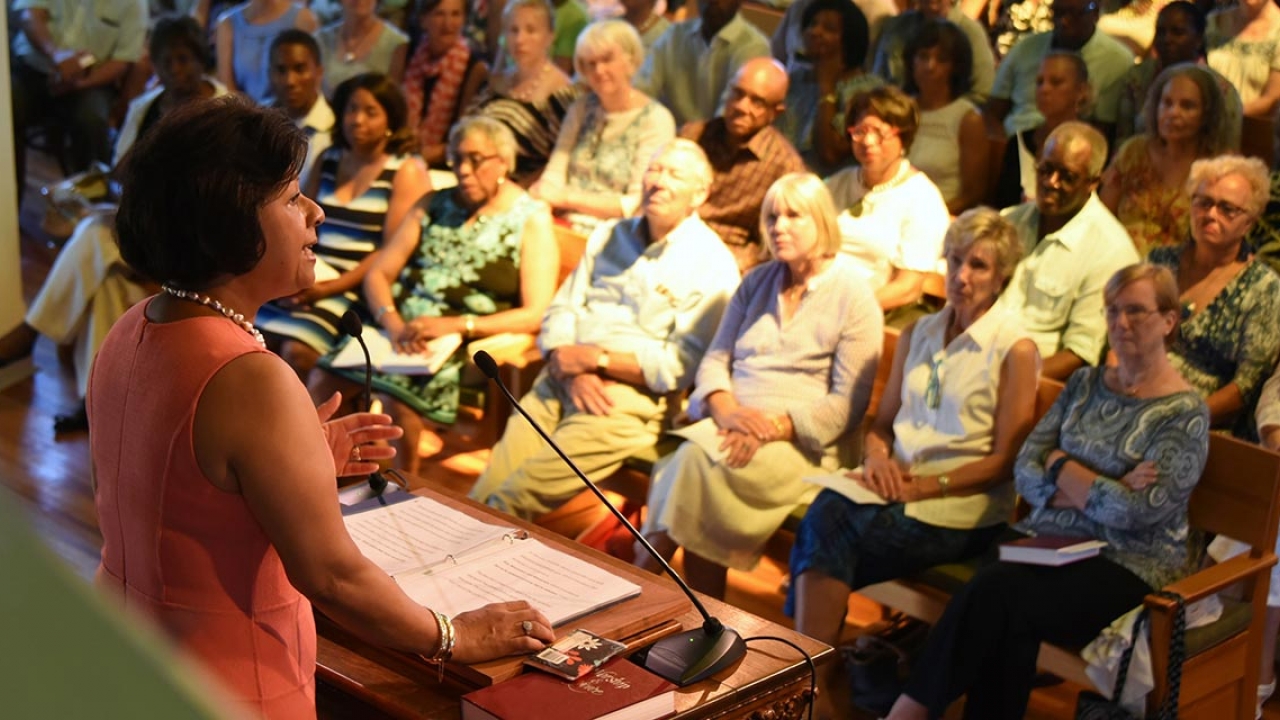Freedom of Expression Was the Focus When President Paula A. Johnson Led the Independence Day Service at Union Chapel

Wellesley President Paula Johnson addressed the issue of free expression on college campuses in a July 4 speech entitled “Freedom of Expression: Beyond Rights, Beyond Words” at Union Chapel, an interdenominational church in Oak Bluffs on Martha’s Vineyard. She spoke during the chapel’s annual Independence Day service, a popular tradition on the island. Past speakers have included former U.S. Secretary of Homeland Security Jeh Johnson, former Massachusetts Governor Deval Patrick, and former Chief Justice of the Massachusetts Supreme Judicial Court Margaret Marshall.
“We must find ways to move beyond either/or thinking. We can be fully committed to freedom of expression and at the same time deeply concerned with the impact of our words on other people,” said Johnson. “Love, kindness, compassion, generosity—these are not values we can check at the campus gates. We must open minds, but we must also open hearts.”
The Vineyard Gazette reported that Johnson situated her topic in the context of the current national political climate. “The idea that college exists apart from the so-called real world has always been a myth, but never more so than now,” Johnson said. “The outside world does not stay outside—and I mean that quite literally.” She noted that the travel ban and a crackdown on immigration are two real-world issues facing college students and their families.
Also distressing, she said, is “the seeming normalization of casually disrespectful treatment of women.” She continued, “So many people feel under threat and at risk of imminent harm. And no one feels this more than people who already felt vulnerable.”
Kay Lehman Schlozman ’68, a political science professor at Boston College, attended the Union Chapel service and said that, as the congregation sang “America the Beautiful,” she smiled in assent as Johnson sang, “and crown thy good with sisterhood.” Of Johnson’s speech, Schlozman said, “She demonstrated a remarkable ability to thread the needle on an issue that is currently roiling American higher education. I came away with a clearer understanding that campuses need to be places where controversial ideas can be aired without being shouted down; that criticism of offensive ideas is not tantamount to censorship; and that academic communities can come together for civil discussion of issues about which there is disagreement.”
Johnson drew connections between her career in medicine, including as professor of medicine at Harvard Medical School and chief of the Division of Women’s Health Boston’s Brigham and Women’s Hospital, where she founded the Connors Center for Women’s Health and Gender Biology, and her role as Wellesley’s president. She said, “My years in medicine taught me to lead with questions and listen intently.… As any number of psychologists will tell you, we grow through challenges that stretch us, not through those that break us…This is what I want for Wellesley students—these stretch-but-not-break challenges.”
She continued, “The good physician approaches each patient with a sense of humility, profoundly aware of the limits of their knowledge. Good physicians also recognize that how they talk to patients is as important as what they say. We need to talk in ways that encourage patients to speak openly—that give them a sense of security and confidence they will be heard. And we need to hear what patients say, even when their words are unclear or halting. Even when they have no words.”
Johnson told the audience that while freedom of expression is an important value, it’s not our only value. “What do I have the right to say? That is an important question—but it’s not the only question. We would also do well to ask ourselves: What do I want to say?” Johnson said this is “a powerful question that calls on us to think about what we say in the context of who we want to be.”
Salem Mekuria, professor of art at Wellesley, attended the service, and said Johnson “delivered a very timely message, and the crowd responded to it with a standing ovation.” She said Johnson “spoke passionately about how precious freedom of speech is for our democracy and the great challenge of exercising this privilege with responsibility, care, and compassion.”



